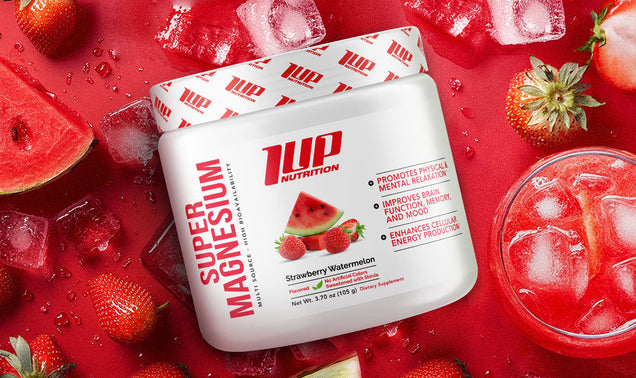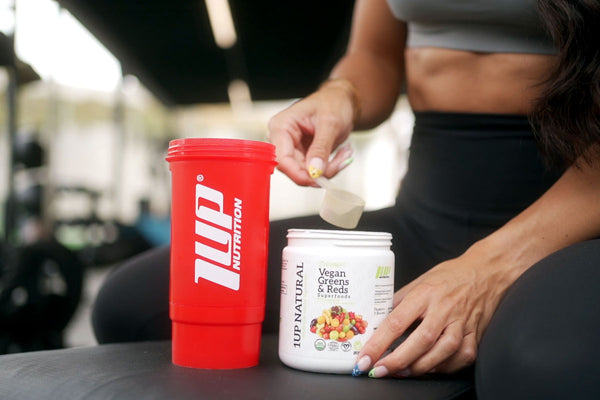The gut microbiome has become an area of increasing interest in recent years, both from the scientific community and everyday health and wellness enthusiast.
We’ve learned that not only does the health & diversity of our gut microbiome affect our digestive health, but it can also impact numerous other aspects of daily life, including immune function, cognition, and mood as well as the quality and appearance of your hair, skin, & nails.
One of the best things that an individual can do to support their microbiome is consume a diverse diet, rich in fruits, veggies, whole grains, nuts, seeds, legumes, and lean proteins, These foods supply the body with a mixture of prebiotics and probiotics that support the health and function of the GI tract.
However, we all have those days when we’re not able to eat like wee need to, or some individuals just may want to increase their intake of plant superfoods through the use of high quality dietary supplements, such as 1UP Vegan Greens & Reds Superfood
In addition to the 19 organic greens & reds fruits and vegetables contained in every serving, we’ve also included a dynamic duo of gut health supplements in Prebiotic Fiber & Heat-Stable Probiotics.
Today, we take a little closer look at how these two support gut health and why you should strongly consider adding them into your supplement regimen.
Prebiotic Fiber (Inulin/Fructooligosaccharides)
Fiber is the non-digestible carbohydrate present in plant foods. However, while our bodies may not be able to break down fiber or utilize it to build muscle or fuel our workouts, it does serve a highly important role for the GI tract -- it serves as “food” for the trillions of bacteria that reside in our bodies.
1UP Vegan Greens & Reds Superfood includes 2 full grams (2,000 mg) of Fructooligosaccharides (FOS) and Inulin, both of which are recognized as health-promoting food ingredients.[1]
Fructooligosaccharides are found in many foods, including:
- Onions
- Asparagus
- Garlic
- Leeks
- Jerusalem artichokes
Inulin is extracted from chicory roots and has a slightly different structure than FOS.
Nevertheless, both FOS and inulin survive transit through the stomach and small intestine intact. Once they reach the colon, they are fermented by various bacteria in our gut and foster the proliferation of bifidobacteria.
In case you didn’t know, bifidobacteria are among the first microbes to colonize the human gastrointestinal and known to confer many positive health benefits.[4]
Moreover, human studies have shown that that the addition of fructooligosaccharides or inulin to the diet may lead to an increase in bifidobacteria.[2,3]
Furthermore, bifidobacterium can provide an additional source of B vitamins (thiamine, riboflavin, cobalamin, folate, and biotin) during dairy fermentation.[5]
Based on this, researchers conclude that both FOS and inulin are effective prebiotics -- beneficially affecting the host by selectively stimulating the growth and/or activity of one or more bacteria in the colon and thus improving host health.
The addition of bifidobacteria can also produce biologically active molecules and enzymes, giving the final food product additional health value.[4,5]
Lastly, when gut bacteria ferments prebiotic fiber, it produces short chain fatty acids (SCFAs), such as acetate, butyrate and propionate, which:
- Support brain function
- Nourish the gut lining
- Promote a healthy inflammation response
- Regulate immune system function
- Support cardiovascular health
- Improve availability of calcium and magnesium
Heat-Stable Probiotics
Probiotics has been a buzzword in the fitness and general health supplements industry for a few years now, but how many people actually know what a probiotic is aside from it being something that supplement companies say is “good” for you?
Probiotics are defined as “live microorganisms, which when consumed in adequate amounts confer a health benefit on the host.”[6]
In other words, probiotics are tiny, living organisms (including bacteria and yeast) that can live in our gut. Keep in mind, though, that not all bacteria are probiotics. The "pro-" prefix dictates those microorganisms that provide a health benefit.
Top dietary sources of probiotics include fermented foods, such as:
- Yogurt
- Kefir
- Kimchi
- Kombucha
- Sauerkraut
- Miso
Probiotics can also be found in dietary supplements; however, not all probiotic supplements are created equal. Some probiotic strains must be refrigerated, otherwise they spoil (die), nullifying their potential health benefits.
One strain that has been shown to be heat-stable is Bacillus coagulans
LactoSpore® -- the same strain included in 1UP Vegan Greens & Reds Superfood.
Not only is LactoSpore® Bacillus coagulan shelf-stable, it is also resistant to bile acids and acidic conditions of the stomach.
Regarding benefits, bacillus is activated in the intestines and is capable of modulating the gut microflora and the immune response.[7,8] Supplementation with bacillus coagulans has also been shown to relieve symptoms of rheumatoid arthritis and IBD as well as support cardiovascular health.[9,10,11]
Why Gut Health is Important
You may be wondering why there has been such a focus on gut health the past few years. Well, the simple reason is that the gut affects numerous aspects of daily life, and improving the balance of good bacteria to bad bacteria has been shown to:
- Improve tolerance to lactose in those with lactose intolerance[12]
- Support immune functioning[12,13]
- Improve blood lipid levels[14,15]
- Reduce muscle damage
- Improve muscle recovery[13]
References
- Borromei C, Careri M, Cavazza A, et al. Evaluation of Fructooligosaccharides and Inulins as Potentially Health Benefiting Food Ingredients by HPAEC-PED and MALDI-TOF MS. Int J Anal Chem. 2009;2009:530639. doi:10.1155/2009/530639
- Bouhnik, Y., B. Flourie, M. Riottot, N. Bisetti, M. F. Gailing, A. Guibert, F. Bornet, and J. C. Rambaud. 1996. Effects of fructooligosaccharides ingestion on fecal bifidobacteria and selected metabolic indexes of colon carcinogenesis in healthy humans. Nutr. Cancer 26:21-29.
- Bouhnik, Y., K. Vahedi, L. Achour, A. Attar, J. Salfati, P. Pochart, P. Marteau, B. Flourie, F. Bornet, and J. C. Rambaud. 1999. Short-chain fructooligosaccharides administration dose-dependently increases fecal bifidobacteria in healthy humans. J. Nutr. 429:113-116.
- O'Callaghan A, van Sinderen D. Bifidobacteria and Their Role as Members of the Human Gut Microbiota. Front Microbiol. 2016;7:925. Published 2016 Jun 15. doi:10.3389/fmicb.2016.00925
- Linares, D. M., Gómez, C., Renes, E., Fresno, J. M., Tornadijo, M. E., Ross, R. P., & Stanton, C. (2017). Lactic Acid Bacteria and Bifidobacteria with Potential to Design Natural Biofunctional Health-Promoting Dairy Foods . In Frontiers in Microbiology (Vol. 8). https://www.frontiersin.org/article/10.3389/fmicb.2017.00846
- FAO/WHO (2001). Report of the Joint FAO/WHO Expert Consultation on Evaluation of Health and Nutritional Properties of Probiotics in Food Including Powder Milk with Live Lactic Acid Bacteria. Rome: Food and Agriculture Organization of the United Nations.
- Kato I, Endo-Tanaka K, Yokokura T. Suppressive effects of the oral administration of Lactobacillus casei on type II collagen-induced arthritis in DBA/1 mice. Life Sci. 1998;63:635–644. doi: 10.1016/S0024-3205(98)00315-4.
- Broek MF van den, van Bruggen MC, Kiipman JP, Hazenberg MP, Berg WB van den. Gut flora induces and maintains resistance against streptococcal cell wall-induced arthritis in F344 rates. Clin Exp Immunol. 1992;88:313–317.
- https://www.medrxiv.org/content/10.1101/2021.07.18.21260556v1.full.pdf
- Mandel DR, Eichas K, Holmes J. Bacillus coagulans: a viable adjunct therapy for relieving symptoms of rheumatoid arthritis according to a randomized, controlled trial. BMC Complement Altern Med. 2010;10:1. Published 2010 Jan 12. doi:10.1186/1472-6882-10-1
- Gupta AK, Maity C. Efficacy and safety of Bacillus coagulans LBSC in irritable bowel syndrome: A prospective, interventional, randomized, double-blind, placebo-controlled clinical study [CONSORT Compliant]. Medicine (Baltimore). 2021;100(3):e23641. doi:10.1097/MD.0000000000023641
- Brestoff, J. R., & Artis, D. (2013). Commensal bacteria at the interface of host metabolism and the immune system. Nature Immunology, 14(7), 676-684.
- Jäger, R., Shields, K., Sharp, M., Partl, J., Wilson, J. M., Lowery, R. P., ... & Purpura, M. (2015). Effects of probiotic supplementation on markers of skeletal muscle damage, perceived recovery and athletic performance after an intense single leg training bout. Journal of the International Society of Sports Nutrition, 12(Suppl 1), P36.
- de Vrese, M., Stegelmann, A., Richter, B., Fenselau, S., Laue, C., & Schrezenmeir, J. (2001). Probiotics—compensation for lactase insufficiency. The American Journal of Clinical Nutrition, 73(2), 421s-429s.
- Abrams, S. A., Hawthorne, K. M., Aliu, O., Hicks, P. D., Chen, Z., & Griffin, I. J. (2007). An inulin-type fructan enhances calcium absorption primarily via an effect on colonic absorption in humans. The Journal of Nutrition, 137(10), 2208-2212.






